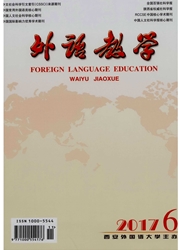

 中文摘要:
中文摘要:
本研究探讨词汇准备时间对外语视听理解及焦虑的影响。受试为三个班109名非英语专业大学生,他们共参与三次英语视听练习,视听之前的词汇准备时间分别为一周、一天及30分钟,视听之后受试参加视听理解测试及问卷与访谈调查,实验采取3×3拉丁方设计以抵消干扰效应。方差分析结果表明,一周的准备时间对视听理解的促进作用最大,一天次之,30分钟最差,后者与前两者差异显著,前两者间无显著性差异;一天的准备时间最有助于缓解学习者视听焦虑,30分钟次之,一周最差,前者与后两者差异显著,后两者间无显著性差异。研究建议外语视听教学中应给予学习者适中的时间进行词汇准备,帮助他们降低视听焦虑,提高视听理解能力。
 英文摘要:
英文摘要:
This study explores the effects of vocabulary preparation time on foreign language audio-visual comprehension and anxiety. The subjects are 109 non-English majors from three classes. They are engaged in three audio-visual tasks, prior to which they have made vocabulary preparation for three different time spans, namely, one week, one day and thirty minutes. After watching the video clips, the subjects participate in comprehension tests, questionnaire surveys and interviews. The ex- periment adopts a 3 ~ 3 Latin Square Design to counterbalance interference effects. The resuhs using Analysis of Variance re- veal that one week' s preparation is the most helpful for improving comprehension, one day' s the next, and thirty minutes ' the least, statistically significant differences existing between the latter and the former two while differences between the former two being insignificant. In terms of relieving anxiety, one day' s preparation works the best, thirty minutes' the next and one week' the worst, statistically significant differences existing between the former and the latter two while differences between the latter two being insignificant. The study puts forward the pedagogical suggestion that in audio-visual teaching students should be given moderate vocabulary preparation time to reduce anxiety and enhance comprehension.
 同期刊论文项目
同期刊论文项目
 同项目期刊论文
同项目期刊论文
 期刊信息
期刊信息
